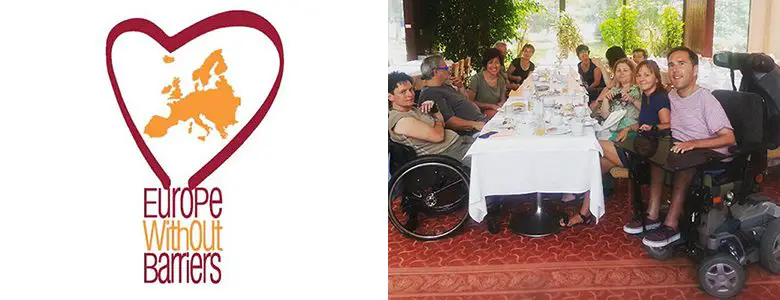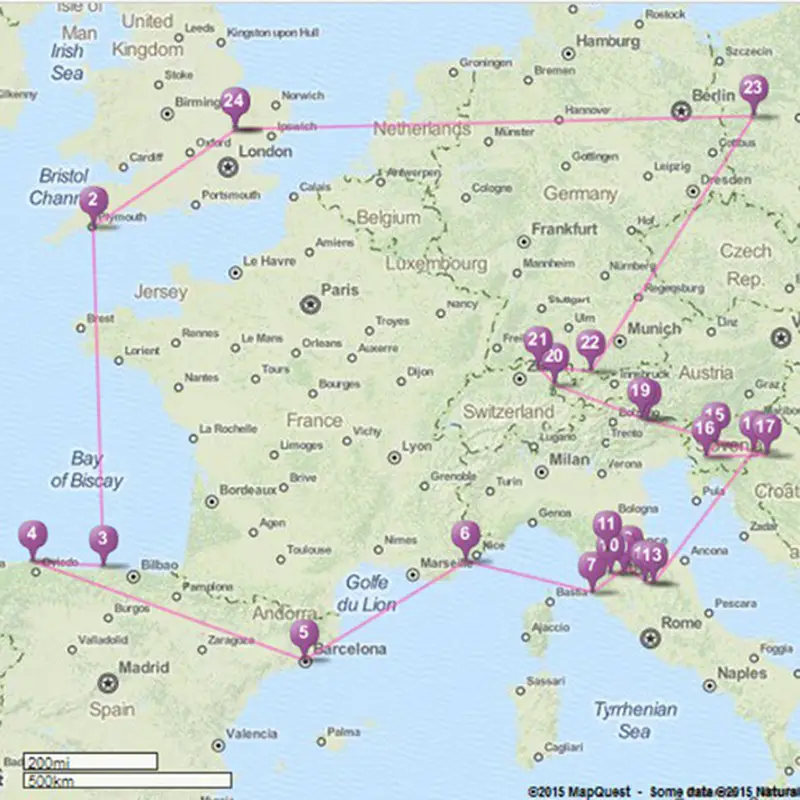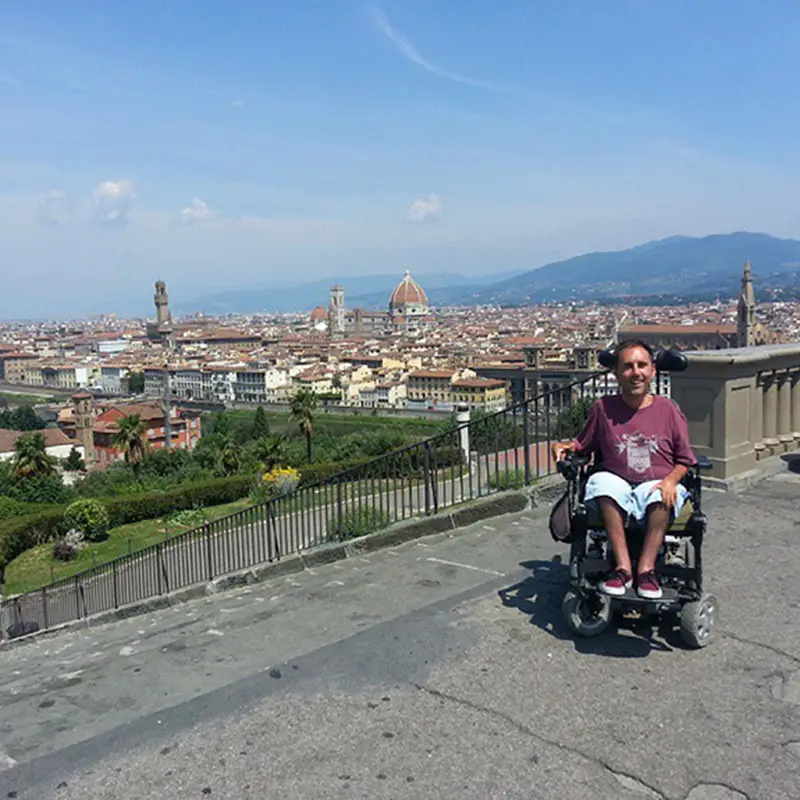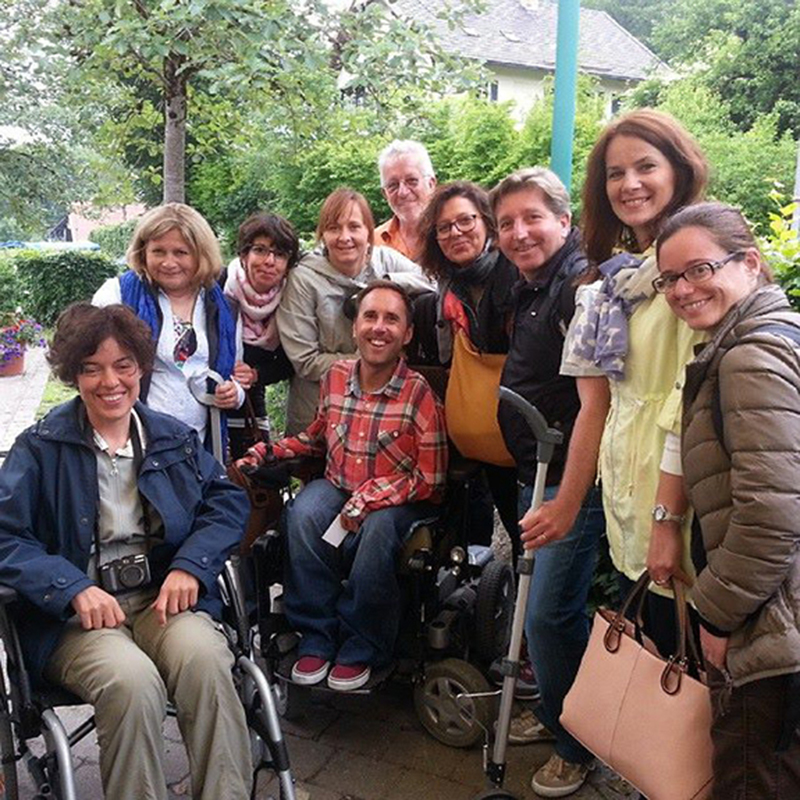
Europe Without Barriers: accessible tourism in action
This article chronicles Martyn Sibley’s participation in the “Europe Without Barriers” project, which involved traveling through five European countries to evaluate the accessibility of hotels, transportation, and tourist attractions. The initiative aimed to develop accessible travel itineraries and promote collaboration among professionals in the accessible tourism sector. Co-Editor Martyn Sibley shares his experience and thoughts from a trip around multiple European countries.
In June 2014 Ivor Ambrose from the European Network for Accessible Tourism (ENAT) kindly invited me to speak in Brussels for a conference on accessible tourism. It was great to meet the living legend in person, and connect with a community of like minded people.
Then in early 2015, as Kasia and I were planning our month long stay in Barcelona, Ivor introduced me to Marco Pizzio from the Italian Multiple Sclerosis charity (AISM). They were coordinating a pilot project with the European Commission called Europe Without Barriers. We were asked to join the project 🙂
From the 5th to the 19th of June a selected group of participants from all over Europe (and from different accessible tourism professions) went to 5 countries, 4 hotels, and multiple tourist attractions (you can see our full itinerary here and read my daily updates on the subsequent blog posts).

The project had 3 main aims; 1) to create accessible itineraries for future travellers with a disability 2) for continued collaboration between the participants 3) to communicate the project far and wide. My role was to test everything from a wheelchair user perspective, feedback any issues for all impairments, and use my blog/social media as a journalist. Kasia was one of the group photographers too.
I wrote these final thoughts from Poland, at Kasia’s parents, before returning to the UK. It’s proving difficult to digest what we actually did, what it meant for us, and the overall project. Here’s my attempt nonetheless…
Transport and equipment
Having our own car, the group minibus for day trips, and my hoist was very useful. For anyone travelling without these items, providing information would be helpful.

Hotels
– I Girasoli: A stunning property run by AISM in beautiful Tuscany. It had brilliant wheelchair access throughout (including to the pool), great staff attitude, fantastic organisational procedures, and amazing food. One improvement is to stop the wetroom overflowing into the hallway.
– Hotel Terme, Catez: Situated with the spa mentioned below, it was a tranquil place to relax with good wheelchair access throughout. However it requires a hoist for pool access, staff training to improve disability attitude and organisational procedures. The buffet food could be better too.
– Casa Letizia, Auronzo Di Cadore: Situated in the middle of the Dolomite mountains of northern Italy, the second AISM ran property was also excellent. Great wheelchair access throughout, and very good quality facilities. There does need to be information on local accessible amenities.
– Hotel Viktor, Viktorsberg: Literally at the top of the mountains in south western Austria, again it had superb wheelchair access, great staff attitude, and procedures. Improvements would include providing information on transport and to create access to the sauna.
As you can see the hotels were broadly accessible for me. Without a doubt they were great fun to visit. There was a need for better signage for people with both hearing and visual impairments. Plus better communication adaptions for deaf people (flashing lights or vibrations for alarms, and better ways to interact with reception from the room).
Activities
Apart from the caves and the castle, all activities were accessible for a wheelchair user such as myself. For me the largest need and improvement everywhere was with staff education, organisational procedures, and signage. This is partly for a wheelchair users benefit (eg. entry points, ramps and toilets). Also this is for the benefit of people with hearing and visual impairments.

Here are some specific notes on each place:
– Arezzo; sufficient ramp at the church. Great atmosphere.
– Siena; one of my best places to go! Just locate the accessible toilet before you are desperate.
– Florence; more bumpy than other places by wheelchair.
– Perugia; I found the pavements here bumpy too. Beautiful fountain and lovely atmosphere nonetheless.
– Assisi; very accessible and very interesting.
– Catez spa; didn’t get to try the pool with a hoist, but did get lifted in our hotel pool. Really enjoyed the Thai massage where the staff were very kind. Also used the sauna and steamroom. An unusual and fun experience.
– Ljubljana; another favourite of the trip. Great city and great atmosphere by the river.
– Zagreb; a very interesting city with an accessible funicular. However not my most favourite trip.
– The lake near Auronzo Di Cadore; unfortunately the weather blocked the views, but the general scenery and area was fantastic.
– Lake Konstanz and Island of Mainau; after the issues on the boat (we were almost refused entry without an Austrian disability card), I found this a great experience. Water is both a personal thrill and relaxation of mine. Also really enjoyed the botanical gardens.
– Castle; very surprised wheelchairs couldn’t go up on the buses. Was a shame to finish the trip with bad access. However it was nice to see the castle from a distance in person.

Overall this project was well arranged, included a good mix of participants (professions, countries, languages, cultures, perspectives), and I believe succeeded with its 3 aims. I would recommend 90% of this itinerary to others, will definitely keep in touch with everyone, and promote all of our achievements.
I wish AISM the best of luck with the rest of this project (they will feedback to the vendors and the European Commission).
My biggest hope is that the occasional issues we faced are turned into positives, by creating change. Mostly having showed what is possible, I hope many more disabled people feel confident to travel 🙂
By Martyn Sibley
Enhancing Accessible Tourism Across Europe
Accessible tourism is essential for ensuring that all individuals, regardless of ability, can enjoy travel experiences. Key components include:
- Barrier-free destinations: Infrastructure and facilities designed for universal access.
- Inclusive transportation: Air, land, and sea travel options that accommodate all users.
- Quality services: Staff trained to meet diverse accessibility needs.
- Engaging activities: Attractions and exhibits that welcome participation from everyone.
- Accessible information: Marketing materials and booking systems that are easy to use for all.
Organizations like the European Network for Accessible Tourism (ENAT) are dedicated to promoting these principles across Europe. By collaborating with various stakeholders, ENAT works to create a more inclusive tourism environment, ensuring that destinations are welcoming and accessible to all travelers.
Originally posted on 16/07/2015 @ 12:30 am